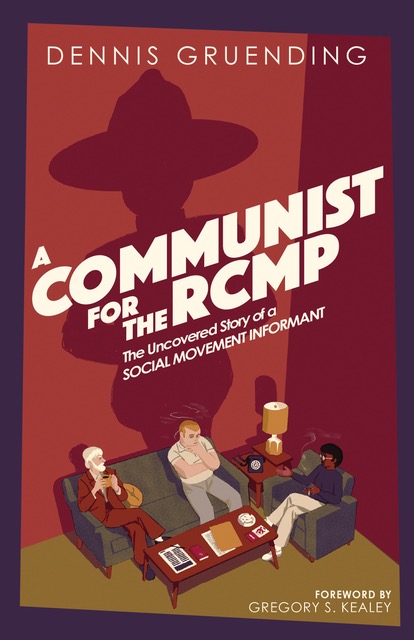It’s not often a book is published detailing the specific activities of an informant for the RCMP.
For that reason alone, A Communist for the RCMP – The Uncovered Story of a Social Movement Informant by author Dennis Gruending, and published by Between the Lines, is an interesting read. But beyond interesting, this 234-page book is also a very important contribution to our understanding of how extensively Canadian Security Services monitor innocent individuals and how they go about it.
Most of us are aware of the RCMP’s longstanding practice of using undercover agents or informants to monitor individuals, demonstrations, conferences and other activities. But it is rare to read about an informant’s activities in such great detail.
This book traces the life of Frank Hadesbeck and shares details of his undercover work as an agent for Canadian security services.
The backstory to this book is almost as interesting as the book itself.
Frank Hadesbeck, the informant, gave a box of personal notes documenting his activities “spying” for the RCMP to a Regina academic. Hadesbeck’s hope, according to Gruending, was that someone else might write a book based on his notes, and so, in 1987 he “gifted” these to Otto Dreidger, who at the time was the Dean of Social Work at the University of Regina. While Dreidger considered the writing project, it never came about. In 2019, Dreidger contacted Gruending to ask if he might want the documents as he was culling his files and was not sure what to do with them.
Gruending recognized the significance of telling the story of Frank Hadesbeck, who informed for the RCMP for 35 years, from 1941 through to 1976.
Writing books is time consuming, particularly books that require a lot of additional research, as this one did. Since Hadesbeck was not a public figure, according to Gruending, it took a lot of research to fill in the gaps between the notes that Hadesbeck left. It was challenging. And according to Gruending, frustrating at times when Freedom of Information requests were stymied and unusually lengthy. Even after publication of the book, some FOI files have yet to arrive.
It takes mettle to dig through these types of documents, then write about it, and also find a publishing house willing to print the story. I think it took grit and moxie on the part of the author, and an intrepid publishing collective like Between the Lines of Toronto, to ensure the telling of this story.
The 35 pages of notes and index attest to the research and detailed sourcing that the manuscript required. Let’s face it — when dealing with security services you want to make sure that the record is clear, unquestionable, beyond reproach. Gruending’s sourcing is meticulous. We the readers benefit from the author’s stamina in telling this story.
A Communist for the RCMP is engaging. Not only does author Gruending provide us with an inside look at what it takes to become an informant, but also how reporting between the informant and his RCMP handlers took place, public meetings attended, and who was surveilled. It also provides insight into Frank Hadesbeck the person — who he was, how he lived, and how he came to be an informant.
Hadesbeck appears to have been a quiet and unassuming fellow, who at times formally joined organizations so that he would have more to report on… and at times made friends with those who he included in his reports. He joined the Communist Party for a time, volunteered on local committees, and in so doing, gained access to membership lists and more.
As Frank Hadesbeck’s life unfolds and covert activities are chronicled, A Communist for the RCMP provides a memorable walk through moments in Canadian and global history. From the settling of western Canada, the depression years on the prairies, through to the Spanish Civil War and the Mackenzie-Papineau Brigade, through to the Second World War, on to the formation of the CCF-NDP and the organizing that took place to create public health care in Saskatchewan, the founding of the National Farmers Union, and much more; readers are reminded of the key social movements that have led to better living conditions in Canada.
The individuals Hadesbeck was ordered to report on had files opened by the RCMP without their knowledge, and without having committed any crime. This is a point that author Dennis Gruending emphasizes on many occasions throughout the book. The people Hadesbeck monitored for the RCMP were challenging the status quo, working to improve social conditions and in so doing exercising their democratic rights.
A Communist for the RCMP makes clear that Hadesbeck was part of a vast network of informants. The RCMP would provide their informants with names and photos and then ask, in this case, Hadesbeck to monitor the individual’s activities and report back. Reports were tagged with a descriptor – Hadesbeck’s was Secret Agent 810 or S.A. 810 – rather than a name so that informants could not be tracked by anyone.
Gruending notes in the book’s preface, that between 1919 and 1979, the Canadian Security Service opened files on more than 800,000 individuals and organizations. “That,” states Gruending in the preface, “is an astonishing number more consistent with a police state than a mature democracy.” Gruending goes on to emphasize: “The Security Service betrayed Canadians by casting such a wide net in its surveillance and using that information against ordinary and well-intentioned people.”
As Gruending states many of these organizations and individuals were community-minded and working to better the circumstances of their urban or rural or global communities. But Hadesbeck received orders to report on them. Some may have been leaders in their organizations, others were volunteering to help challenge inequities or improve social conditions. They were progressives who were advocating for much-needed improvements. Some of those individuals today are members of the Order of Canada, or celebrated for outstanding community and social service.
These people were part of farmers’ movements, labour unions, environmental groups, the public health care movement, the peace movement, the women’s movement, academics and university students, Indigenous movements, human rights groups, and recognized political parties such as the CCF and later the NDP, especially the Waffle movement within the NDP, as well as the Communist party. Hadesbeck included names on what he called his “Watch Out lists.” Some of the names on his list include Tommy Douglas, a.k.a the father of Medicare and named ‘the Greatest Canadian,’ as well as farm leaders such as Roy Atkinson.
In the end Hadesbeck’s “Watch Out list” runs to more than 2,000 pages. In a recent interview for this review, Gruending clarified just how long that list was.
“If I had included all of the names in the book,” states Gruending, “my book would have looked more like a phone directory… the people the RCMP was interested in had done nothing wrong. They were exercising their rights as good citizens to engage in various organizations and in the democratic process.”
How did being included in Hadesbeck’s surveillance reports impact lives and organizations? Hadesbeck’s reports would have been added to that provided by a wide net of informants. As Gruending notes at the Saskatoon launch of A Communist for the RCMP, people’s names were placed on lists for a reason. Security Services monitor people so that they can be targeted, identified and picked-up at will.
In a final chapter titled “Suppressing Dissent,” Gruending emphasizes that surveillance in Canada continues. The technology used to surveil has changed since Hadesbeck’s time, of course, but informants are still used alongside digital methods. These days Canadian security services surveil environmentalists and climate activists, those who campaign against the oil and gas industry and pipeline projects, or support the peace and anti-war movements, Indigenous land-defenders, among others.
Asked what he hopes A Communist for the RCMP will achieve, Gruending responds:
“By telling the story of Frank Hadesbeck in a detailed way, I have been able to show how the RCMP organized and executed its surveillance on Canadians for much of the 20th century. He was a low level RCMP informant, but there were undoubtedly many more like him in the towns, cities, mines, packing plants, and factories across Canada. And as I show in my last chapter, a close reading of the news and other sources indicates that the RCMP’s focus on communists in past decades has shifted to focus on environmentalists and Indigenous land defenders. The RCMP has traditionally been employed by the state to maintain the political and economic status quo. Those progressives who challenge that mandate can expect to be surveilled and harassed. It is important to blow the whistle on that.”




